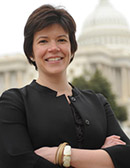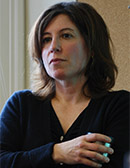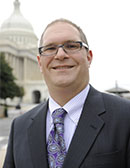The Great Recession: Over But Not Gone?
IPR researchers document ongoing effects
Get all our news
We are still not exactly sure why so many more families are skipping meals or going for a day without eating even after we take income-to-poverty rates into account,” Schanzenbach said. “But these rates are revealing some of the deep hardships that families are experiencing even today, likely due to stubbornly high rates of unemployment.”
Diane Whitmore Schanzenbach
IPR economist

Foreclosure signs around the nation continue to illustrate to the lingering effects of the worst economic
downturn since the Great Depression.
While the U.S. economy is predicted to take off this year, it also still seems to lie in the shadow of the Great Recession, a period in which more than eight million Americans lost their jobs, nearly four million homes were foreclosed each year, and 2.5 million businesses were shuttered. Though it officially ended more than four years ago, how has the biggest U.S. downturn since the Great Depression affected—and continued to affect—Americans' lives? Several IPR faculty are mining data from this period (from roughly December 2007 to June 2009) in a variety of areas, detailing its short- and longer-term effects, with an eye towards policy prescriptions.
Food Insecurity | Income Inequality| Unemployment/Foreclosures | Foreclosures/Schooling | Fertility
Food Insecurity

Food insecurity spiked dramatically during the Great Recession, and approximately 49 million Americans according to 2012 USDA figures, more than ever before, live in food insecure households. With funding from the Russell Sage Foundation, IPR economist Diane Whitmore Schanzenbach and her colleagues are determining if families from this period onward have had consistent access to healthy foods and whether family members have skipped meals, gone hungry, or not had enough money to buy food.
Their data show that from 2004 to 2007, just over 11 percent of U.S. households were classified as food insecure. This rate rose more than one-third to nearly 15 percent between 2008 and 2011. One out of five households with children under 18 is now considered food insecure, with those led by single mothers particularly at risk.
“We are still not exactly sure why so many more families are skipping meals or going for a day without eating even after we take income-to-poverty rates into account,” Schanzenbach said. “But these rates are revealing some of the deep hardships that families are experiencing even today, likely due to stubbornly high rates of unemployment.”
The researchers pointed to a series of “insults” brought on by dramatic job losses during the Great Recession: No income meant no subsidies from the Earned Income Tax Credit. Access to credit dried up, in particular from home equity. Food and energy cost more (though inflation has been low overall), soaking up a larger share of low-income household budgets. When taken together, the unfavorable conditions closed off avenues that the poor typically use to weather bad economic patches.
Safety net programs such as food stamps are designed to help navigate such economic downturns, Schanzenbach argues, and thus policymakers should seek to fund and strengthen them. “They are vital to the poor and their well-being, especially in times of great economic distress,” she said.
Income Inequality and Public Opinion

During the Great Recession, income inequality also grew to its widest point since the Great Depression, with 95 percent of the gains from economic recovery since 2009 going to the top 1 percent of earners. Although the conventional wisdom is that the public does not care about inequality, IPR sociologist Leslie McCall’s latest book, The Undeserving Rich, upends this view: She shows that, over the past 25 years, Americans have been most bothered by economic inequality when they feel it is restricting economic opportunity and social mobility. Their concerns about inequality peak not during recessions, but during recovery periods when expectations are high.
In post-Great Recession America, McCall has noticed that politicians are not only making this connection for the first time, but they are making it the defining message of their electoral campaigns. She cited examples such as Bill De Blasio’s winning New York City mayoral campaign and Governor Jerry Brown’s successful 2012 ballot initiative in California that raised taxes on those earning more than $250,000 a year.
Rather than proposing tax hikes as a way to reduce income inequality or to meet governmental revenue needs in general, the politicians’ “next, and more effective, argument has been ‘We’re going to raise taxes on the rich because economic inequality has reduced the chances of achieving economic security for low- and even middle-income Americans,’ ” McCall said. Her research suggests that the public would generally favor redistributive policies that expanded opportunity, by promoting greater equity in the workplace, capping CEO salaries, and raising taxes on the wealthy to improve education.
While McCall emphasizes that the relationship between rising economic inequality and diminished social mobility has not been conclusively proven, Americans do perceive a connection between the two. “Americans favor economic growth as part of the solution, but they also want to see that growth being shared and distributed among the population at large rather than concentrated only in the upper classes,” she said.
"As documented by the breadth of studies undertaken by IPR researchers, it will take researchers decades to understand the far-reaching effects of the Great Recession," Schanzenbach said. "Many of the challenges most Americans faced have not just disappeared even though the economy seems to be recovering—we still need to seek out and provide scalable and sustainable policy responses to crippling problems, such as long-term unemployment, increased poverty, lower wages, and a shredded safety net, among others."
Unemployment Insurance and Housing

Following the housing market meltdown during the Great Recession, the federal government launched subsidies for mortgage modifications and other housing programs to buoy the market and head off foreclosures. New research by economist and IPR associate Brian Melzer and his colleagues shows that dramatic expansions of unemployment benefits also acted as a housing stabilizer. Their preliminary findings suggest that unemployment insurance extensions between 2008 and 2012 perhaps averted one million foreclosures.
“Default is costly, and job joss is the primary cause of default,” Melzer said during a recent IPR colloquium about ongoing research with the Federal Reserve’s Joanne Hsu and Northwestern’s David Matsa. He notes that foreclosure is costly for borrowers but also entails social costs due to lapses in owners’ home maintenance and price declines for nearby homes. So can unemployment insurance help avoid such costs by providing support for unemployed homeowners?
To understand this issue, the researchers exploit variation in unemployment benefits across the 50 states and over time. For example, a worker laid off in 2011 could collect up to $28,000 in benefits in Massachusetts but only $6,000 in Mississippi. Maximum benefits also grew faster in some states, increasing by 20 percent in Florida but by 160 percent in New Mexico between 1992 and 2011.
Melzer and his colleagues compare these changes in maximum benefits to trends in loan delinquencies. Their preliminary findings show that for every $1,000 increase in maximum jobless benefits, delinquent mortgages drop by 2 percent, and evictions fall by 10 percent among unemployed homeowners. Focusing on recent differences due to unemployment insurance extensions in the Great Recession, they find similar effects.
“Where unemployment insurance is more generous, lenders see fewer defaults and better payoffs,” Melzer added. They also seem to pass on benefits to potential borrowers, who receive more credit offers, higher credit limits, and lower interest rates when unemployment insurance is more generous. In addition to enabling the unemployed to keep up with monthly food and other expenses while seeking work, he said that unemployment insurance also seems to have an “important safety net effect for borrowers with mortgages outstanding and others seeking credit.”
Foreclosures and Children’s Schooling

During the Great Recession and ensuing housing downturn, the number of families with homes “underwater,” where the house was worth less than their mortgage, surged. Florida ranked second in the nation for underwater mortgages with close to 30 percent of mortgages waterlogged in 2013, according to analysts. Using data on Florida school children, IPR Director and education economist David Figlio and his colleagues are investigating how such negative home equity can affect student test scores.
“On the one hand, we could expect to see that the increased stress and possible housing instability associated with foreclosure could negatively affect children,” Figlio said. “On the other, negative equity could have some positive effects like forestalling a move thereby ensuring school continuity or using money that might have gone to a mortgage to pay expenses that might help children instead.”
The researchers are following more than 60,000 children from the time they moved to the state between 2003 and 2005 through 2013. They observed how their test scores changed, matching them to likely changes in their families' home equity during Florida’s subsequent housing boom-and-bust cycle, which differed dramatically across the state. Their preliminary findings reflect this dramatic swing in home prices statewide. Depending on the date when the families moved to the state and the local housing market, some parents and their children experienced deep negative equity, while others none at all. A working paper is forthcoming.
Fertility and Demographic Changes

Evidence from previous recessions suggests that poor economic conditions can lower fertility rates, especially when joblessness is high. Government reports show that the fertility rate dropped from a recent high of nearly 70 births per 1,000 U.S. women in 2007 to just over 63 in 2012. IPR social demographer Christine Percheski and her colleague Rachel Kimbro of Rice University are investigating how the decline in fertility varied across communities.
They found that women in areas with high unemployment and mortgage foreclosure rates were less likely to become pregnant than women in areas with better economic conditions. Teenage girls in areas with high unemployment rates were actually more likely to become pregnant than those in areas with lower unemployment, though overall pregnancy rates for teens fell during the recessionary years.
As part of this research, Percheski and Kimbro are exploring how local economic conditions might affect how likely it is for married, co-habiting, or single women to get pregnant. Examining fertility rates for single women and those who have children with multiple partners is particularly important because U.S. rates are on the rise, and they are also associated with increased family complexity, lower child well-being, and higher risk for poverty.
“Overall, the recession will probably not have dramatic, long-term demographic effects,” Percheski said. Most couples will likely just postpone getting married or having a baby for a few years rather than foregoing marriage or parenthood altogether.
Percheski speculates that in some of the hardest-hit communities, especially where unemployment remains persistently high, fertility and marriage rates might be less likely to rebound in the next few years. She points out that health clinics in areas that still have high rates of unemployment and mortgage foreclosures might have increased demand for family planning services, which could place an additional strain on already stretched clinics and doctors who serve the poor.
Diane Whitmore Schanzenbach is associate professor of human development and social policy and an IPR fellow. Leslie McCall is professor of sociology and of political science and an IPR fellow. Brian Melzer is assistant professor of finance and an IPR associate. David Figlio is Orrington Lunt Professor of Education and Social Policy and of Economics and IPR director. Christine Percheski is assistant professor of sociology and an IPR fellow.
Photo credits: Top image by Jeffery Turner; all others by P. Reese and L. Kossoff
Published: January 23, 2014.


